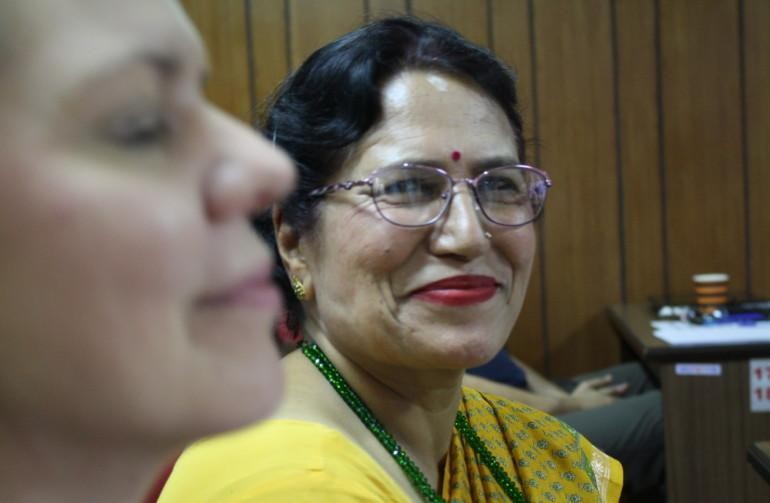Curriculum, skill and networking development at the Lalitpur Nursing Campus, Nepal

On paper, the DVINE project focuses on holistic tools to develop competence-based curricula, while promoting dignity in the partaking countries and institutions. In practice, these aims can be realized in various ways, as has also been the case with the Lalitpur Nursing Campus (LNC) of Patan Academy of Health Sciences (PAHS) in Nepal.
The developments at the LNC during the DVINE project can be roughly divided into four main areas: physical learning environment improvement, network and partnership development, pedagogical and professional competence enhancement, and skill implementation development. In practice, the development has taken shape in various ways from capacity building to teaching, learning, training and networking.
Common values, shared direction
The foundations of PAHS were established already back in 1959 with a mission to develop nursing education in the region and especially in rural areas, particularly through educating women to the profession. As time has passed, the academy has had an impressive trajectory of consistent growth, learning and development, while staying focused on its core mission.
Throughout the years PAHS and the LNC has partaken in different global projects such as the HOPE (Holistic Partnership in Social Work and Health Care Education) -project between 2007 and 2015, also organized in cooperation with Diak. As such, for PAHS and the LNC, the DVINE project has come as a natural continuation to the partnership.
Tangible gains, holistic competence building and global networking
– Professionally I am extremely proud of my students and my institution, says Professor Sarala K.C., when asked about her views on the developments of her institution following the DVINE-project.
Professor Sarala K.C. is the Dean of the School of Nursing and Midwifery (SoNaM) at the LNC. She has 32 years of experience working extensively in the field in different positions and she is currently working in her second term as the Dean of SoNaM after her reappointment. Professor Sarala has gained years of experience in cooperative projects aiming to develop the LNC, which in turn has given her a front row seat to observing the effects they have had on PAHS.
To ensure the capability to implement newest teaching techniques and resources developed in cooperation with the DVINE project, supplies like laptops, desktops and projectors, especially to support the class coordinators, have been in a vital role as far as material support goes. Beyond this, the DVINE project has also supported the enhancement of qualitative research done at the LNC through teaching materials and other resources, giving more agency to the LNC and its independent development.
Taking part in the project has also further strengthened the LNC’s global network:
– We have been able connect with different institutions namely from Norway, Turkey, Vietnam and Finland. Students who go on exchange also get to develop their skills in the partner countries, and when they come back to Nepal, they can bring that knowledge with them and implement it in their workplace, Professor Sarala elaborates.
Building on pre-existing strengths
LNC has throughout the project’s time received a lot of insight over how the pre-existing curriculum could be further developed, particularly by implementing DVINE’s objectives and competencies. To meet the LNC’s individual needs, the DVINE project has arranged a variety of trainings and workshops from singular intense courses to broader curriculum workshops, in order to indicate points of development and determine most ideal methods to improve the pre-existing curriculum.
Holistic pedagogical and professional development has at the LNC meant development that runs both on an organizational, structural level, as well as on the implementational level. With the curriculum, rebuilding the teaching and the learning in the campus where necessary has been at the core of most recent developments.
To ensure sustainable development, the recognition of shortcomings and pre-existing strengths has been kept at the heart of development since the beginning. As a result, currently the LNC in in the middle of piloting the realization and later finalizing their new curriculum including the new implementations taken from the DVINE.
Bringing patients and professionals closer with better communicational competence
While teaching materials, networking opportunities and curriculum changes have made possible important developments at the LNC, in immediate patient-professional-contact and teaching one factor has developed beyond expectations: communication.
Throughout the DVINE participation the LNC has moved further away from a more traditional, theory-based learning techniques towards a mixed method that includes more proactive, reactive communication skills. By focusing on learning and teaching about communicational competence, interactions between professionals and patients have as a result become more fluent and natural.
This has been made possible by implementing roleplay-like aspects into teaching, but also by recognizing shortcomings in overall communication competence with all patients. Beyond just typical communicational competence, a lot of time and effort has also been poured into teaching more tangible communicative skills, namely sign language.
By taking a more comprehensive developmental viewpoint, improvements made have been able to reach not just the quality, but also the scope of communication to those, who would not otherwise necessarily be able to get sufficient care due to communicational barriers.
– Throughout this time we have learned how to communicate better with our patients in so many different ways, it has been all very new for us. Students have become more flexible in their communication after diversifying our teaching methods. Thanks to this the students have become more skillful and practical in communicating with the patients and their families, Professor Sarala sums with a smile.
Text: Milja Lehtinen
Photo of Professor Sarala K.C.: Ulla Niittyinperä
The writer is an Intercultural Encounters master’s student from the University of Helsinki, currently working as a Communications Intern at Diaconia University of Applied Sciences, Finland.
